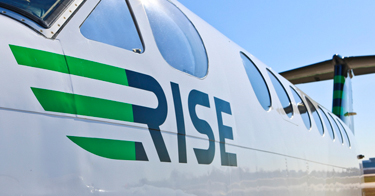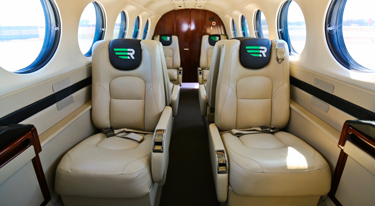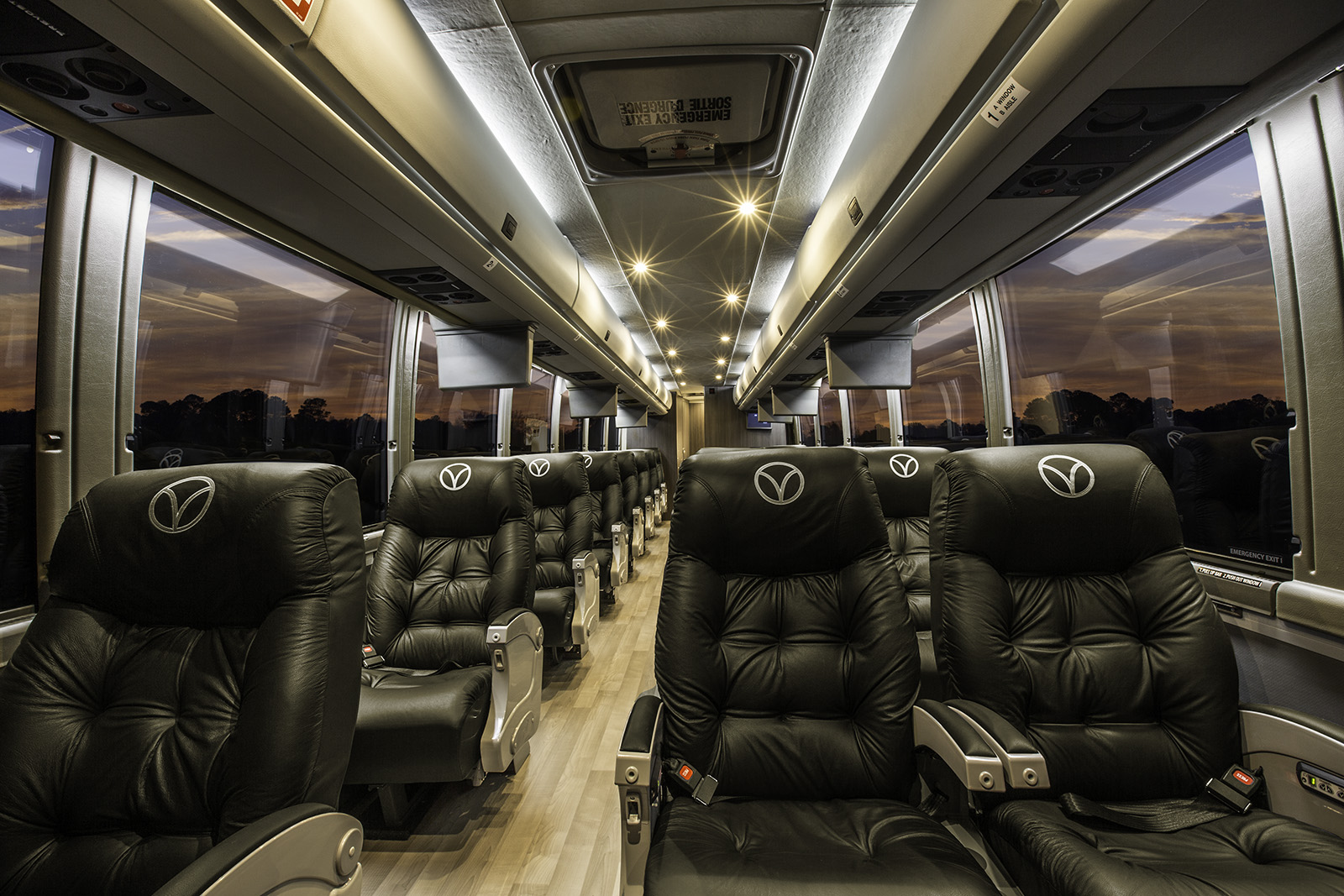© 2016 The Texas Lawbook.
By Kerry Curry
(Oct. 3) – As managing partner at Jackson Walker, Wade Cooper travels around the state regularly, especially between Austin and Dallas.
“I’m Mr. Alternative Travel,” Cooper quips. “I’ve tried everything.”
As commercial airline travel becomes more challenging with long security lines, limited parking availability, crowded gates, baggage fees, crammed seats and delayed flights, travel-weary lawyers are looking for other options.
Startups have responded.
Within the past two years, attorneys in Dallas, Houston and Austin have more options to navigate the Texas triangle, including crowdsourcing of private planes and a luxury bus line. San Antonio is on tap to receive some of these travel opportunities soon.
Taking to the air in private planes
Cooper uses RISE, a one-year-old Dallas-based startup that schedules time for business travelers on private planes.
The company is one of several private jet clubs that have sprung up around the country to attract exasperated commercial flyers. Others include Florida-based JetSmarter and Massachusetts-based Magellan Jets. Not all have survived. One of the first entrants, Florida-based BlackJet, ceased operations in May. Another, Beacon, which flew between New York and Boston, also went out of business earlier this year.
Typically, private air services, whose business models vary, don’t own or operate the aircraft but purchase capacity. They offer technology-based client booking —done online or through mobile apps — and handle membership and concierge services.
Nick Kennedy, CEO of RISE, said the company expects to reach profitability this year. It’s been self-funded to date, but Kennedy said its first capital raise is imminent and will fuel its growth to cover expansion into more cities. The company, he said, doesn’t take funds in advance — members pay month to month — so attorneys shouldn’t be concerned about liability in terms of financial commitments.

“Our business is pretty simple,” Kennedy says. “We go find frustrated travelers who are looking to get time back into their lives.” RISE charges about $2,000 a month for unlimited flights.
Passengers go to an FBO — fixed-base operator — at Dallas Love Field, Houston Hobby or Bergstrom to catch the flight. They only need to arrive a few minutes before takeoff and can leave their cars parked at the FBO for free. When passengers land, a rental car is ready for them, if needed, right outside the airplane’s doors with the air conditioner running.
RISE runs about 60 to 70 one-way flights per week, most on a King Air 350, which seats eight.
Kennedy estimates that 20% to 25% of memberships involve attorneys or law firm staff and said most are corporate accounts that allow a set number of attorneys or staffers from a member firm to use the corporate account.

Cooper subsidizes his own single membership and charges back the firm a two-week commercial airline rate. He estimates that an attorney would need to take four to five round trips per month on RISE to make the price comparable to using a commercial airline.
“I come close to that so I carry a little bit of the cost as opposed to what it would be on a commercial flight, but I can make it from my apartment in downtown Austin to my office in Dallas in less than two hours,” Cooper said. “That is pretty spectacular. You save about an hour and you save the frustration of having to park in a remote lot and take a van to the terminal and then walk through security and through the terminal. There’s just a lot less wear-and-tear, which is fantastic,” he said.

One drawback for attorneys is the limited number of flights, he said.
“It works great for someone who knows they have to go to Dallas or Austin or Houston and can schedule around their [RISE’s] service,” he said. “If you need the flexibility of staying an hour later, then it doesn’t work so well. For someone not tied to a particular schedule or who can work their schedule around (RISE’s) schedule, you can’t beat the comfort.”
Riding in style on a luxury bus line
Shaun Mathew, a Vinson & Elkins attorney, is based in the firm’s Austin office. He counsels senior management, boards of directors and private equity investors in a wide variety of complex business transactions, corporate governance matters and other special situations, including advising clients on shareholder activism.

No such option exists in Texas. The Amtrak train from Austin to Houston takes nearly five hours.
“A few months ago I found out about Vonlane. It sounded amazing, almost too good to be true,” he said. “I’ve used it a few times and I absolutely love it. I got into downtown Houston in two and a half hours sharp and worked the entire time.”
The buses have WiFi, lapdesks for laptops, multiple outlets, comfortable seats, plenty of legroom plus a drink and food service. Each is equipped with a conference room in the back that can be reserved for no extra charge.
“You could actually go with a group of your colleagues and take over the back of the bus,” Mathew said. “It’s perfect for this commute. For me, it’s a five-minute walk to V&E Houston from where they drop you off.”
Charles Gillis, executive director of Dallas-based Munsch Hardt Kopf & Harr, travels regularly between the firm’s Austin, Dallas and Houston offices.
“I used to actually enjoy flying,” Gillis said. “The last few years it has just really changed. It used to be cheap and you could get down to Austin in an hour. What used to be an hour hop is now a three-hour hassle.”
The planes are tight and have a “cattle-pen” feel which makes getting any productive work done nearly impossible, he said.

Like Mathew, Gillis said he decided to try Vonlane.
“All the issues that frustrated me with flying were just gone,” he said.
“If I leave on the early bus, I’ll do an hour and a half of work and then I’ll take a nap,” Gillis said. “You arrive rested and refreshed. My jacket has been hung up so it’s not all wrinkled. I get off the bus like I just woke up and here I am, ready to roll, with zero stress. How do you beat that?”
For a time, Gillis was using Vonlane every week as the firm built out its Houston office. Now he uses it about once every six weeks. The firm has even chartered Vonlane buses from Dallas and Houston for an attorney retreat in Austin. Gillis said Munsch Hardt has also talked with RISE but wasn’t sure they had the level of travel to justify a membership.
Alex Danza, president and CEO of Vonlane, said attorneys enjoy Vonlane because they can be productive during the travel time.
“The transit time for a 50-minute flight can be three hours or more and they are losing billable time,” Danza said. “Our attorneys love that they can arrive five minutes before departure time. They come aboard right away and can start working and can be billable for the entire trip. We take them right into downtown so they avoid that additional transfer they need from the airport into downtown.”
Danza said buses have only 22 seats compared to 55 to 56 seats in a normal intercity motorcoach.
Prices range from $79 to $99 one way. Vonlane, which serves routes between Dallas, Houston and Austin, plans to add service in February between San Antonio and Houston.
More options on the way?
Eventually, luxury motorcoaches, private jet clubs and commercial airlines may have additional competition: high speed rail connecting Dallas and Houston. The train will take travelers between the two cities in just 90 minutes and offer trips every 30 minutes during peak times. This option is a ways off. Passenger service isn’t anticipated until 2021.
Whatever mode of transportation they choose, attorneys say they are just glad to have some alternatives.
“I had 2 million miles, prior to RISE, traveling back and forth out of Dallas,” RISE’s Kennedy said. “The amount of time I wasted in transit was probably a year of my life,” he said. “Everyone wants more time in their life. It’s the most valuable commodity in the world.”
© 2016 The Texas Lawbook. Content of The Texas Lawbook is controlled and protected by specific licensing agreements with our subscribers and under federal copyright laws. Any distribution of this content without the consent of The Texas Lawbook is prohibited.
If you see any inaccuracy in any article in The Texas Lawbook, please contact us. Our goal is content that is 100% true and accurate. Thank you.
